If you’ve ever lost track of a contract, missed a renewal date, or couldn’t remember who last approved a deal — welcome to the club. That’s exactly where I was before I discovered how much easier life gets with the right contract management software.
Let’s face it — managing contracts manually is a headache. Between endless email chains, scattered documents, and confusing spreadsheets, even a small mistake can cost you money or damage a client relationship. It’s not just time-consuming; it’s risky.
That’s why I tested the most popular tools to find those that actually make contract management simple, fast, and stress-free.
In this blog, I’ll walk you through the 10 best contract management software solutions, sharing what really works — and how these tools can save your team from chaos.
Top 10 Contract Management Software
Finding the right contract management software can be challenging with so many choices out there.
To make things easier, here’s a quick comparison of the top 10 tools that stood out for their features, usability, and value across both small business and enterprise needs.
| Tool | Best For | Pricing |
|---|---|---|
| BIGContacts CRM | Contact management & email marketing | Free for small teams. Paid plan starts at $9.99/month |
| PandaDoc | Sales proposals and quick eSignature | Starts at $19/user/month |
| DocuSign CLM | Integrated e-signature with contract workflow | Starts at $25/user/month |
| ContractWorks | Simple contract repository | Starts at $600/month |
| Concord | Collaborative contract drafting & templates | Starts at $49/user/month |
| CobbleStone | CLM & procurement compliance | Starts at $59/user/month |
| Ironclad | Enterprise legal contracting | Starts at ~$60/user/month |
| Agiloft CLM | Highly customizable CLM for complex needs | Custom pricing |
| Icertis | Enterprise contract compliance & analytics | Custom pricing |
| LinkSquares | AI contract analysis & obligation tracking | Custom pricing |
| Evisort | AI-powered contract data extraction | Custom pricing |
| Conga Contracts | Salesforce-integrated CLM & CPQ | Custom pricing |
| Gatekeeper | Vendor & contract management (unlimited users) | Starts at $995/month |
1. BIGContacts – Best for Contact Management & Email Marketing
I’ll admit, I was initially skeptical about using a CRM tool for contract management – but BIGContacts CRM surprised me. In my first week of using BIGContacts, I realized how easily it helped me manage and organize contacts and contract-related communications in one place.
One thing that stood out in my experience was the email marketing integration. However, this unique angle turned out beneficial – I was able to send out contract renewal notices and track client responses directly through the CRM. It felt like the software “understood” the relationship side of contracts, ensuring I stayed engaged with clients throughout the contract lifecycle.
Another aspect I enjoyed was the simplicity. I’ve used more complex contract management systems that required days of training. By contrast, BIGContacts was up and running within minutes. The learning curve was almost non-existent, which meant I could focus on negotiating and managing contracts rather than figuring out how to use the tool.
Pros:
- Organize contacts in one place—customer info, emails, and documents in one view.
- Built-in email marketing and automation features make it easy to send contract reminders and nurture client relationships.
- Collaborative features like shared task management and contact hand-offs make it ideal for teams that need transparency in their sales or service processes
- Offers task and follow-up reminders to ensure no contract deadlines or renewals are missed.
Cons:
- No downloadable or on-premise version
- Dark user interface option not available
Pricing:
Free for small teams. Paid plan starts at $9.99/month.
2. PandaDoc – Best for Sales Proposals and Quick eSignature
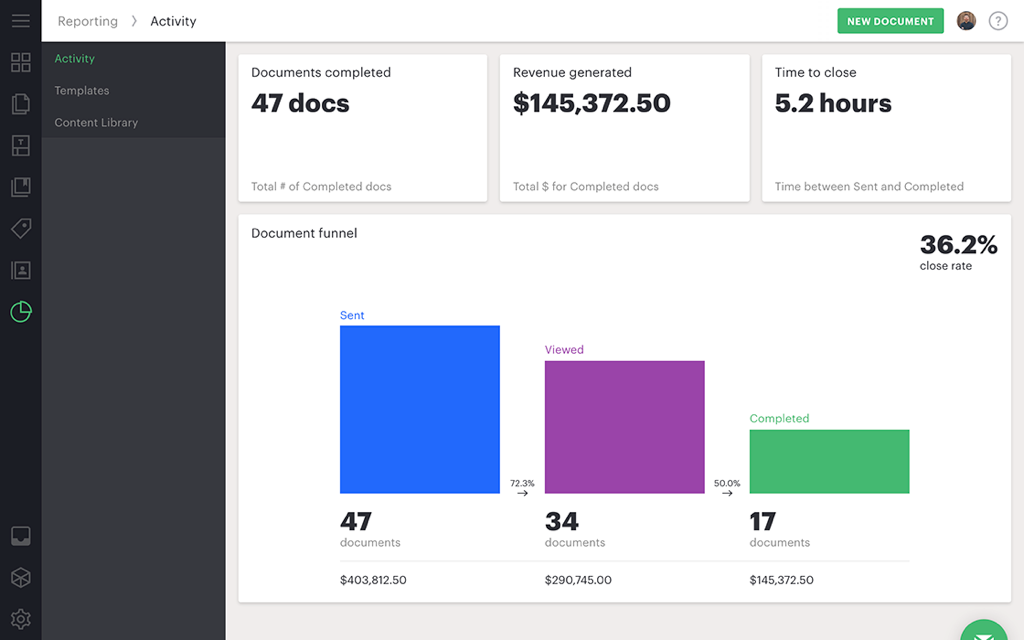
Image source: PandaDoc
When I tried PandaDoc, it instantly felt like having a digital assistant for proposals and contracts. I could pull up templates, fill in the details, and send out contracts for signature within minutes. It cut down my manual work drastically.
I loved how easy it was to see when clients opened and signed documents. The live tracking kept me in the loop and helped me close deals faster. It also made my contracts look polished with custom branding and visuals.
The only limitation was post-signature tracking. Once deals were signed, I had to manage compliance manually. But for drafting and eSignatures, PandaDoc remains one of the most convenient tools I’ve used.
Pros:
- Drag-and-drop editor for easy creation of contracts and proposals.
- Integrated eSignatures with real-time signing notifications.
- Supports branding, visuals, and pricing tables for professional presentation.
- Syncs smoothly with CRMs like HubSpot and Salesforce.
Cons:
- Basic post-signature management; lacks deep compliance tracking.
- Limited advanced approval or redlining workflows.
Pricing:
Starts at $19/user/month.
3. DocuSign CLM – Best for Integrated E-Signature With Contract Workflow
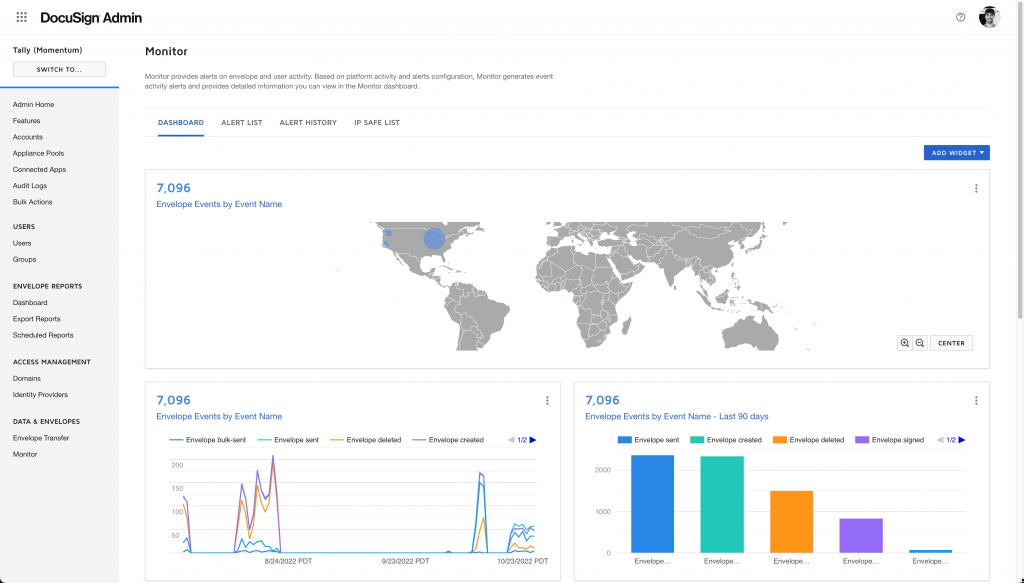
Image source: DocuSign
I’ve always relied on DocuSign for eSignatures, but its CLM platform changed the game for me. I could draft, route for approval, and get contracts signed without ever leaving the app. It made my entire workflow feel unified.
My team loved how simple it was to send NDAs or agreements. Even non-technical members could set up templates and track statuses easily. It gave everyone visibility into where each contract stood.
While the system worked great for signing, I wished the search and reporting were stronger. Still, for managing contract lifecycles and approvals, DocuSign CLM brought structure to our legal process.
Pros:
- Unified platform combining drafting, approval, and signing.
- Workflow builder simplifies routing and tracking approvals.
- Integrates tightly with Microsoft Word for easy edits.
- Central contract repository with version history and audit trail.
Cons:
- Search and analytics features could be more robust.
- Complex edits often require external tools like Word.
Pricing:
Starts at $25/user/month.
4. ContractWorks – Best for Simple Contract Repository
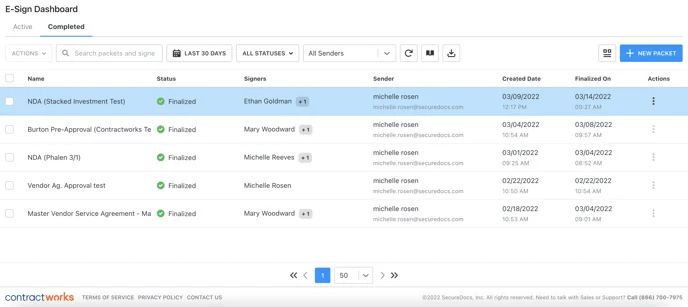
Image source: ContractWorks
When I first logged into ContractWorks, the simplicity was refreshing. I uploaded all my signed contracts in minutes, tagged them, and instantly made them searchable. No overcomplication—just efficiency.
The real highlight was how it handled alerts. I never missed a renewal again because ContractWorks reminded me ahead of every key date. It became my go-to repository for every agreement.
While it doesn’t do advanced drafting, it’s perfect for storing, signing, and tracking contracts. It’s the tool I recommend to anyone tired of chasing PDFs across shared drives.
Pros:
- Super quick setup and intuitive contract repository.
- Built-in eSignatures and customizable alerts for renewals.
- Flat monthly pricing simplifies budgeting.
- Advanced OCR makes scanned contracts fully searchable.
Cons:
- No in-platform contract authoring or redlining.
- Limited integration options with other tools.
Pricing:
Starts at $600/month.
5. Concord – Best for Collaborative Contract Drafting & Templates
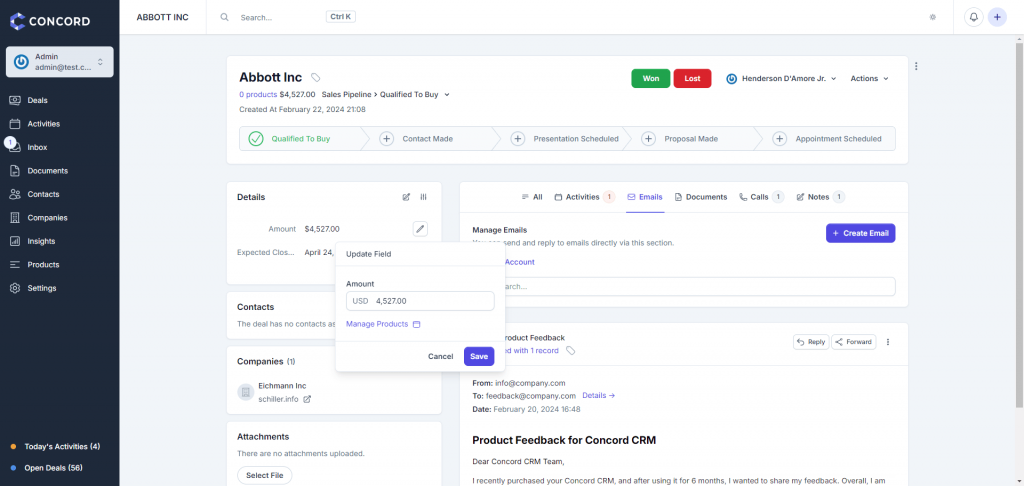
Image source: Research.com
I remember drafting my first contract on Concord—it felt like Google Docs built for lawyers. I could edit, comment, and negotiate in real time without endless email threads. Collaboration became seamless.
Its template system made creating standard contracts easy. I could lock essential clauses while allowing flexibility where needed. It saved my team hours on repetitive edits.
Although it’s not the most advanced tool, Concord’s simplicity made it a favorite for my small legal team. It kept everything in one place and reduced approval delays dramatically.
Pros:
- Real-time collaboration for editing and commenting.
- The template library simplifies creating standardized contracts.
- Built-in eSignatures reduce dependency on external tools.
- Integrates with popular storage tools like Google Drive and Dropbox.
Cons:
- Basic reporting and analytics.
- Limited customization for complex workflows.
Pricing:
Starts at $49/user/month.
6. CobbleStone – Best for CLM & Procurement Compliance

Image source: Above the Law
Using CobbleStone was like managing contracts on autopilot. Once I set up workflows and clause libraries, compliance tracking became effortless. It kept every department accountable.
I found its reporting extremely useful during audits. Every clause, renewal, and approval was traceable. It made compliance-heavy environments much easier to navigate.
It’s not the simplest platform, but if you need full control and automation for contracts, CobbleStone does it all—just be prepared for a learning curve.
Pros:
- End-to-end CLM with robust compliance tracking.
- Clause libraries enforce standardized language.
- Advanced multi-step workflows for reviews and approvals.
- Comprehensive audit trails and reporting dashboards.
Cons:
- Steeper learning curve for new users.
- Overkill for small businesses with simple needs.
Pricing:
Starts at $59/user/month.
7. Ironclad – Best for Enterprise Legal Contracting
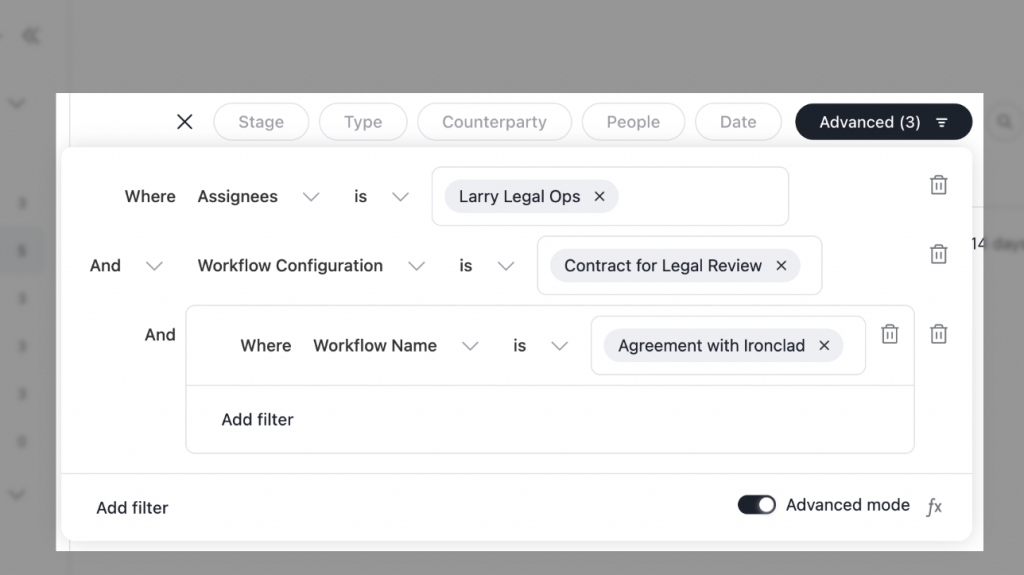
Image source: Ironclad
I used Ironclad at a tech company, and it felt like having an AI-powered legal assistant. The automated intake forms for new contracts saved me countless emails from the sales team.
Its redlining and version control were lifesavers. I could see every change made by a client and compare versions side by side. Negotiations became smoother and faster.
While implementation took some effort, once it was up and running, it transformed how our legal team worked. It’s built for speed and compliance at scale.
Pros:
- Self-service intake forms for contract requests.
- AI clause detection ensures standard language use.
- Real-time collaboration and in-app comments.
- Powerful integrations with CRMs and Slack.
Cons:
- High cost compared to mid-tier tools.
- Long implementation period for customization.
Pricing:
Custom pricing (typically around $60/user/month equivalent).
8. Agiloft CLM – Best for Customizable CLM for Complex Needs
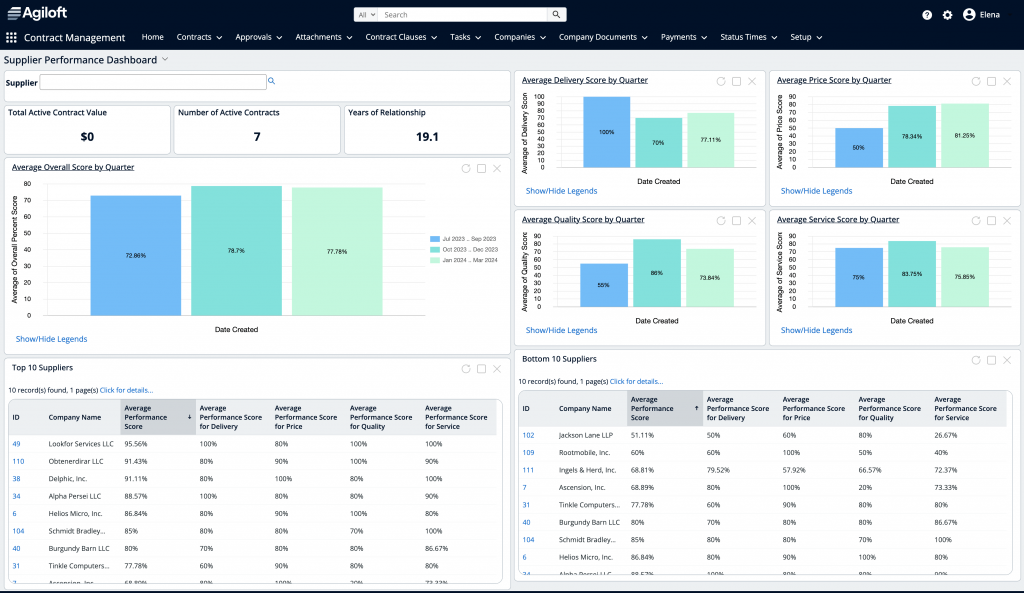
Image source: G2
At first glance, Agiloft felt complex—but I quickly realized its true strength lies in customization. I could shape it exactly to my workflow without writing a single line of code.
I built automated alerts for contract obligations and renewal tasks, which saved our team from missed deadlines. The system adapted to our internal approval rules flawlessly.
While it’s not the flashiest platform, Agiloft’s flexibility made it invaluable for large teams with unique needs. Once configured, it runs like a well-oiled machine.
Pros:
- Fully customizable without coding.
- Automated workflows for compliance and renewals.
- Handles complex multi-department approvals easily.
- Flexible deployment options, including on-premise.
Cons:
- Dated interface compared to newer tools.
- AI and analytics need separate configuration.
Pricing:
Custom pricing (varies by modules and users).
9. Icertis – Best for Enterprise Contract Compliance & Analytics
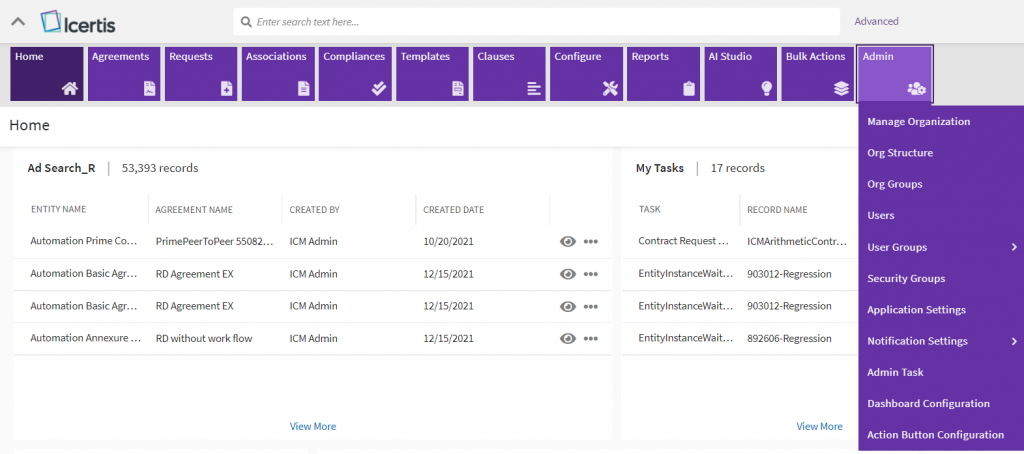
Image source: Icertis
When I started using Icertis, I instantly saw why large enterprises trust it. It enforces compliance so strictly that risky contracts can’t even get approved without the right clauses.
The analytics dashboard became my daily check-in. It showed bottlenecks, renewal timelines, and even clause performance insights. It turned data into action effortlessly.
Setup took time, but the results were unmatched. For global operations where compliance is non-negotiable, Icertis delivers precision and control like no other.
Pros:
- Enforces compliance through automated rule checks.
- AI identifies risks and extracts key terms automatically.
- Enterprise-ready with global, multi-language support.
- Seamless ERP and CRM integrations.
Cons:
- Expensive and complex to implement.
- Long deployment cycles.
Pricing:
Custom pricing (typically enterprise-level, six-figure annually).
10. LinkSquares – Best for AI Contract Analysis & Obligation Tracking
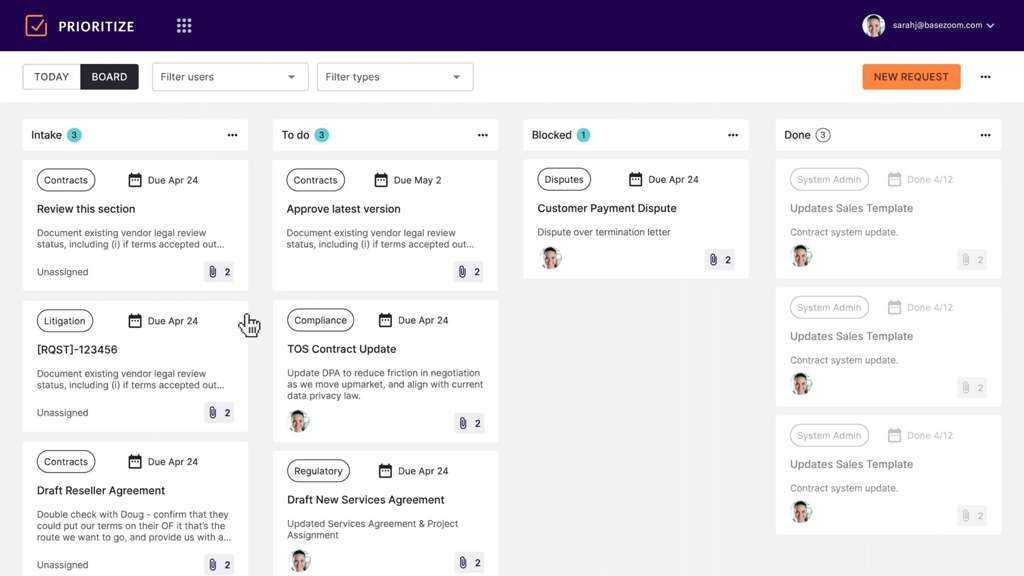
Image source: LinkSquares
Using LinkSquares felt like unlocking hidden insights from old contracts. Its AI scanned my entire repository and surfaced key data points like renewal dates and risks instantly.
The search functionality was brilliant. I could type “non-compete” and find every clause across thousands of documents within seconds. It felt like legal superpowers.
It’s more of an analytics tool than a drafting system, but for post-signature visibility, nothing beats it. I finally understood what was hiding in my contracts.
Pros:
- AI extracts critical terms and clauses from uploaded contracts.
- Concept-based search for locating obligations and risks.
- Detailed dashboards for contract portfolio insights.
- Strong integrations for exporting contract data.
Cons:
- Limited pre-signature features.
- Best suited for larger contract volumes.
Pricing:
Custom pricing (typically starts in five figures annually).
My Top 3 Picks for the Best Contract Management Software
If you’re still unsure and just want the best of the best, here are my top three recommendations that truly stood out during testing.
1. BIGContacts
When I started using BIGContacts, I was amazed by how effortlessly it combined contact management, email marketing, and contract tracking in one simple interface. It helped me organize client data, automate follow-ups, and capture leads directly from forms—without needing any extra tools. For small and growing businesses that want an intuitive, all-in-one CRM with seamless contract handling, BigContacts is an unbeatable choice.
2. PandaDoc
I found PandaDoc incredibly efficient for preparing, customizing, and sending contracts in minutes using its drag-and-drop templates and integrated eSignatures. It made my approval cycle smoother and added a professional touch to every document I shared. It’s perfect for teams that value speed and presentation, though its post-signature compliance tracking could be a little stronger.
3. DocuSign CLM
Using DocuSign CLM gave me complete visibility into every stage of my contracts, from drafting and approval workflows to eSignatures and storage. The audit trails and version control features made managing complex agreements feel effortless. It’s a powerful enterprise-ready solution, but the initial setup can take a bit of time for teams that are new to contract automation.
Benefits of Using Contract Management Software
Implementing contract management software can transform the way your organization handles agreements. Here are some key benefits:
1. Centralized Contract Repository
With a dedicated system, all your contracts are stored in one secure, searchable place. No more digging through email attachments or shared drives – you can quickly pull up any contract, old or new. This centralization also means better version control; everyone accesses the latest agreement, reducing confusion.
2. Improved Compliance and Risk Management
Contract software helps ensure you don’t miss critical obligations or regulatory requirements. Many tools function as contract compliance management software by automatically tracking deadlines (renewals, expirations) and key clauses.
For example, you can get alerts for renewal dates or if a contract lacks a required compliance clause. This proactive approach helps avoid penalties, missed renewals, or other costly compliance slip-ups.
3. Faster Contract Cycles
Automation and templates speed up the drafting and approval process. According to Goldman Sachs, automating contract management can cut negotiation cycles by 50%.
Instead of starting from scratch each time, your team can use pre-approved templates, collaborate in real-time, and route contracts for e-signature instantly. The result is faster deal closures and the ability to handle more contracts with the same team.
4. Enhanced Collaboration and Visibility
Contract management tools often include commenting, change tracking, and user permissions. Legal, sales, procurement, and other stakeholders can all work on the same platform, seeing the status of each contract in real-time.
This transparency prevents bottlenecks – if a contract is stuck awaiting approval, you’ll know exactly who needs to act. Some platforms even provide a dashboard view of all contracts in progress, so managers can identify and address delays.
5. Data-Driven Insights
Over time, you accumulate a wealth of data in your CLM system – and many tools help you analyze it. You can identify trends like average contract value, common negotiation sticking points, or supplier performance metrics. These insights support better decision-making.
For instance, you might discover that contracts with a certain clause (like a shorter payment term) close faster, informing how you draft future agreements.
6. Scalability for Growth
As your business grows, manual contract processes that once “worked” can quickly become liabilities. A contract management software ensures your process scales – whether you go from 10 to 1000 contracts a year.
This is especially crucial for enterprise contract management software scenarios, where multiple departments and locations are handling contracts. A good CLM system will accommodate increasing volume and complexity without a drop in efficiency.
Pro Tip: If you’re new to contract management software, start small. Begin by digitizing your existing contracts into a repository and setting up basic alerts. Once you and your team get comfortable, you can gradually roll out advanced features like automated workflows or AI analysis.
Evaluation Criteria
To curate this list of the best contract management software, I evaluated each tool across multiple practical and performance-based factors. Here’s what guided the selection:
1. Core Functionality
Each tool was assessed on its ability to handle end-to-end contract processes—drafting, approval, eSignatures, storage, and renewals. Solutions with strong automation, document versioning, and tracking capabilities scored higher.
2. Ease of Use and Implementation
I looked for platforms that offer intuitive dashboards, minimal setup time, and short learning curves. Whether it’s a small team or an enterprise legal department, the best software should make contract management simple, not stressful.
3. Compliance and Security
Since contracts often involve sensitive data, tools with built-in compliance tracking, permission controls, and encryption were prioritized. The best legal contract management software ensures data integrity and adheres to standards like GDPR or SOC 2.
4. Integration Capabilities
A great contract tool should work smoothly with other business apps. Each software was evaluated for integrations with CRMs, communication tools (like Outlook or Gmail), and financial systems to ensure seamless workflows.
5. Scalability and Flexibility
The list includes both SMB-friendly tools and enterprise contract management software that can grow with your organization. Scalability in user access, customization, and automation was a key consideration in the selection process.
6. Pricing Transparency and Value
Every platform was reviewed for its pricing structure—whether it offers affordable entry plans or enterprise-grade packages. I considered total cost of ownership, including setup, support, and feature access, to ensure real-world value for different business sizes.
7. Customer Support and Reliability
Responsive, knowledgeable support teams make adoption smoother. I factored in customer reviews, response times, and onboarding quality to highlight tools that genuinely support users beyond the purchase stage.
8. Innovation and User Feedback
Finally, I analyzed how frequently each tool updates its features and how well it responds to user feedback. Platforms that actively evolve with technology trends—such as AI analytics, smart alerts, or automation—earned higher placement.
Manage Contracts & Clients Seamlessly for Smarter Business Growth
Choosing the right contract management software isn’t just about staying organized—it’s about saving time, improving compliance, and reducing costly mistakes. The right system turns your contracts into valuable assets that drive accountability and transparency across your organization.
Whether you’re handling complex legal agreements or managing simple client contracts, modern tools can automate repetitive work and help teams collaborate effortlessly. You’ll gain more control over renewals, approvals, and compliance, freeing your focus for strategic decisions.If you’re looking for a flexible and easy-to-use platform that brings contact and contract management together, BIGContacts is worth trying. It offers email automation, form integration, and even a free plan for growing businesses, making it a smart choice for teams that want simplicity without losing functionality.
Frequently Asked Questions
What features should I look for in contract management software?
You should evaluate features such as: e-signature integration, dashboard and analytics, clause libraries, approval workflows, searchability of contract text, renewal/expiration alerts, and integrations with your CRM/ERP systems.
What is the difference between contract management software and a CRM?
While a CRM focuses on customer relationships, leads, and sales workflows, contract management software is built to manage contracts themselves—handling legal terms, obligations, renewals, and compliance across the lifecycle.
How long does it take to implement a contract management software?
Implementation time varies greatly: simple systems can be up and running within days, while enterprise-grade solutions with custom workflows and integrations may take several months. The key is aligning your team and process before launch.
FREE. All Features. FOREVER!
Try our Forever FREE account with all premium features!







